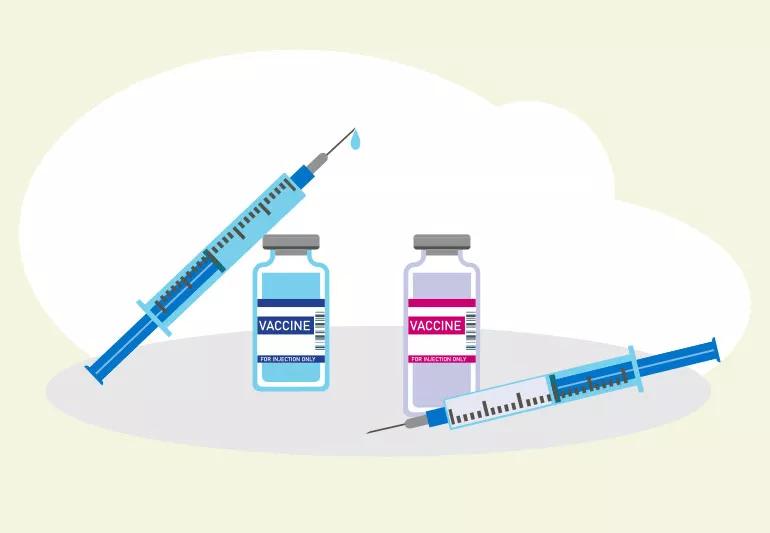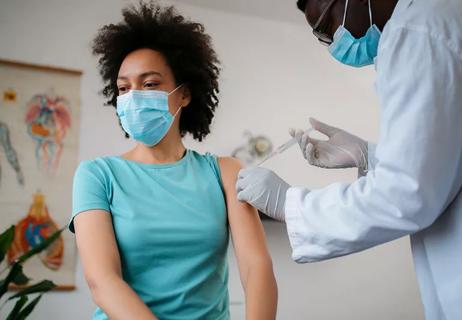Getting routine vaccinations together can save you time and may be more effective

Getting vaccinated is safer than getting sick. But if you’re traveling abroad, older than 65 or plan to get vaccinated for influenza (flu) and COVID-19, the number of vaccinations you need can feel overwhelming.
Advertisement
Cleveland Clinic is a non-profit academic medical center. Advertising on our site helps support our mission. We do not endorse non-Cleveland Clinic products or services. Policy
What if you could get multiple vaccines in one visit — the old one-and-done approach? It’d be more convenient, but is it safe?
Primary care specialist Daniel Sullivan, MD, answers that question and explains what you need to know about getting more than one vaccine at a time.
The short answer is yes. “Research and medical experience suggest that most adults can safely receive more than one vaccine during the same visit,” says Dr. Sullivan.
Getting more than one vaccine doesn’t mean mixing all the vaccines in a single syringe and getting only one shot, though. It means you can safely get multiple, separate vaccines during one appointment.
Mixing or combining vaccines into one shot is only OK for certain formulations approved by the U.S. Food and Drug Administration (FDA). One approved combo is HepA-HepB — a single vaccination that guards adults against both hepatitis A and hepatitis B.
While it’s safe, there are still some pros and cons to weigh about getting multiple, separate shots in one visit. Let’s take a look.
Overall, doubling or even tripling up on vaccines offers more benefits than downsides.
“If you don’t mind getting multiple shots, combining vaccines into a single appointment can be a practical option to save time and reduce office visits,” Dr. Sullivan says.
Advertisement
Check out these potential benefits of getting multiple vaccinations at once.
Vaccines trigger your immune system to produce antibodies — proteins that recognize and attack a disease or virus.
You may wonder if your body can mount an immune response to more than one vaccine at a time. Dr. Sullivan explains that, in some cases, getting vaccines at the same time may even help the immune system respond more effectively, though individual results can vary.
“Getting a vaccine improves your body’s immune response,” Dr. Sullivan explains. “The second vaccine enhances that response and intensifies your ability to react to the vaccine trigger.”
He also recommends getting multiple vaccines in the same arm whenever possible. Research suggests it may encourage a stronger immune response than vaccines given in different limbs.
“When multiple vaccines target the same local lymph nodes, those lymph nodes produce more antibodies and help your body build a stronger response to the vaccine,” he adds.
Whether you’re due for routine vaccinations or simply want to stay healthy this winter, getting the vaccines you need can be challenging if you need multiple appointments.
“Most routine vaccines for adults can be given at the same time,” Dr. Sullivan notes. “For instance, we offer the flu shot and COVID-19 vaccine together so it’s easier for patients to protect themselves without the hassle of coming back.”
Wondering how many routine vaccines you can get at once? It’s a matter of preference.
“Our nurses have given people four or more vaccines in one appointment if it’s what the patient wants and needs,” he says. “Not everyone wants that many pokes in one sitting, but it’s safe and saves your multiple trips to the office.”
Getting more than one shot in the same arm is safe, but it may not be ideal for everyone.
Your healthcare provider may want to give the shots in separate limbs if you are:
Some people have concerns about which vaccines can be given together. In most cases, routine vaccines can be administered at the same time, though there are a few important exceptions.
Dr. Sullivan explains those situations.
Advertisement
People age 65 and older and those who are at high-risk for certain complications shouldn’t get some vaccines at the same time.
For example, people age 65 and older need two pneumococcal vaccines, PCV and PPSV23 (23-valent pneumococcal polysaccharide). But you can’t get both vaccines on the same day.
Plan to get PCV first. Then, after eight weeks, you can get PPSV23. If you mistakenly get PPSV23 before PCV, that’s OK. But you’ll have to wait a year before getting PCV.
People with certain spleen issues or HIV also have limits on how many vaccines they can get at once. If you have these conditions, plan to get pneumococcal conjugate and meningococcal vaccines at separate times.
In general, if you have health conditions or any concerns, talk to your healthcare provider about the most appropriate vaccination schedule for you.
Traveling abroad often requires vaccinations that aren’t routine in the United States. Certain travel vaccines can’t be given at the same time.
For example, if you need vaccines for both cholera and typhoid fever, you need to get the cholera vaccine first. You’ll then need to wait at least eight hours to get the typhoid vaccine.
Vaccines use either a weakened (live) form of a disease or an inactivated one. Both trigger your immune system to fight off infection.
Advertisement
Live vaccines tend to create a stronger immune response, so you don’t want to get more than two live vaccines at the same time. Some examples of live vaccines include:
“You can get two live vaccines on the same day,” Dr. Sullivan says. “After that, you’ll need to wait four weeks to get another live vaccine. The spacing helps achieve the appropriate immune response.”
If you’re due for multiple vaccines and prefer to receive them in fewer visits, in most cases that’s possible. The safest approach is to review your options with your healthcare provider and make a plan that works best for you.
Advertisement
Learn more about our editorial process.
Advertisement

Tetanus is easy to prevent but tough to treat — vaccines are your best defense

Older studies suggesting a link have been completely discredited — vaccinations are safe and effective

From influenza and COVID-19 to pneumococcal, shingles and more, vaccines help keep you healthy

Baby’s caregivers should be up-to-date on flu, COVID-19 and Tdap vaccines to protect the newborn in their lives

The answer varies from person to person and vaccine to vaccine

They can stop an infection before it gets you sick or prevent you from becoming seriously sick

Previous vaccines against smallpox might provide some protection

Pain after a vaccine is normal — but here's how you can avoid it

The tropical fruit is a good source of antioxidants and vitamin C

Most people fall asleep within 10 to 20 minutes, but if your experience is different, adjusting your sleep schedule may help

Exploring your hidden side can lead to better understanding of what makes you tick